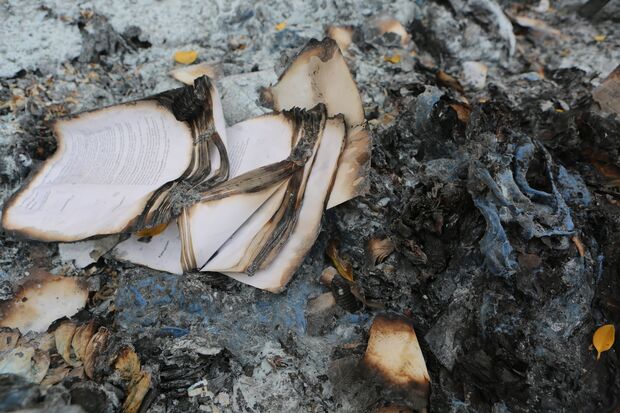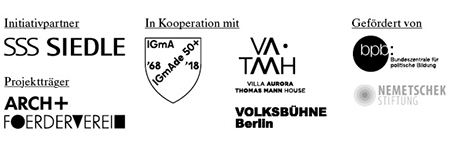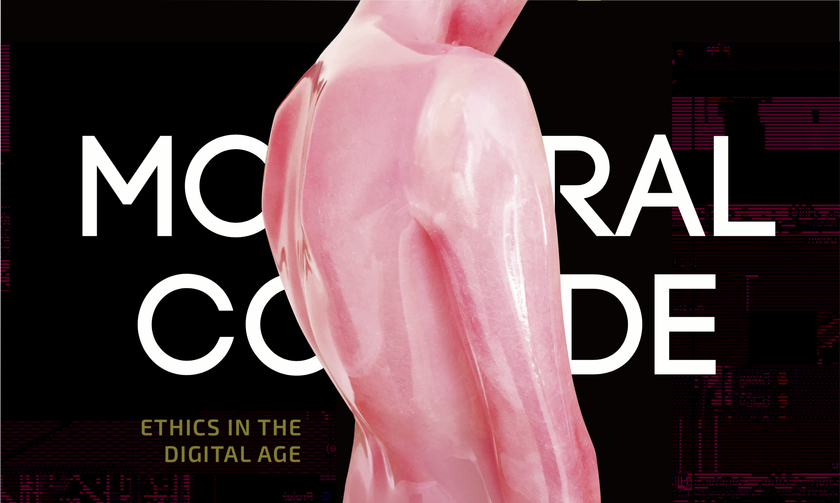Thomas Mann House Events Archive
May 2019
Lecture: Democracy Will Win - An Evening with Frido Mann
Santa Monica

Born in the United States, Frido Mann sensed the democratic creed of his parents and grandparents from childhood on. They had managed to leave Europe for the U.S. just in time before the outbreak of WWII. During his extended lecture tours, Thomas Mann, Frido's grandfather, addressed his American audiences with his speech “The Coming Victory of Democracy” warning of the dangers of fascism for a liberal democracy: “The social renewal of democracy is the presupposition and the guarantee of its victory.”
Following in his grandfather's tracks, Frido Mann is going to give lectures in more than a dozen cities in the United States and Canada. He will address the current crises in the American and European democracies and the need for their restoration, on the basis of a transatlantic dialogue as initiated by the government of the Federal Republic of Germany. The evening at the residence of the German Consul General in Los Angeles is going to be the prelude to the lecture tour.
Frido Mann was born in 1940 in Monterey/California. He studied music, catholic theology, and psychology and worked as a clinical psychologist in in Münster, Leipzig and Prague. He now lives in Munich and works as a freelance writer. His recent publications are "An die Musik. Ein autobiographischer Essay" (Ode to Music: An Autobiographical Essay) and -together with Christine Mann -"Es werde Licht. Die Einheit von Geist und Materie in der Quantenphysik" (Let there be Light: The Union of Spirit and Matter in Quantum Physics). In August 2018, S. Fischer published "Das Weiße Haus des Exils" (The White House of Exile) about the Thomas Mann House in Los Angeles.
Location
Residence of the German Consul General Los Angeles.
By invitation only.
An event hosted by the German Consulate General Los Angeles and the Thomas Mann House.
Surviving the Flames: A Remembrance of the Nazi Book-Burnings
Los Angeles

On May 10, 1933 students at several German universities burned books by authors deemed politically suspect. Vast crowds watched enthusiastically, as the writings of Bertolt Brecht, Alfred Döblin, Lion Feuchtwanger, Aldous Huxley, Heinrich Mann, Klaus Mann, Franz Werfel and others were thrown onto bonfires. In Berlin, some 40,000 people gathered to hear Joseph Goebbels deliver a speech condemning Jewish literature and propagating „reliability and commitment to the German spirit“. The book burnings in Germany elicited worldwide protests and triggered counter-demonstrations in many American cities.
Thomas Mann’s grandson Frido Mann will mark the 86th anniversary of the book burning with a reading from the works of Heinrich and Thomas Mann, Oskar Maria Graf, Bertolt Brecht, and Erich Kästner. Frido Mann was born in Monterey, California in 1940. He studied Catholic theology and psychology and worked as a clinical psychologist in Münster, Leipzig, and Prague. Today, Frido Mann resides in Munich as a freelance author. In August 2018, he published “Das Weiße Haus des Exils" (“The White House of Exile”, S. Fischer) about the Thomas Mann House in Los Angeles, where he is currently staying as an Honorary Fellow.
Prof. Mann will be accompanied by violinist Alena Hove (Colbourn School).
Location
By invitation only.
An event hosted by Villa Aurora and Thomas Mann House.
Rechte Räume: Ein architekturpolitischer Reisebericht
Berlin

With: Armen Avanessian, c/o now, Wojciech Czaja, Verena Hartbaum, Tina Hartmann, Gal Kirn, Philipp Krüpe, Andreas Rumpfhuber, Zsuzsanna Stánitz, Matteo Trentini, Anna Yeboah and others
Welcome/Introduction: Anh-Linh Ngo (ARCH+)
Moderation: Stephan Trüby (IGmA)
The rise of the (New) Right has also entailed architectural policy implications. The research project can be considered a contribution to the re-politicization of the architectural discourse. And also as a contribution to the spatialization of political discourse, since "right spaces" are not discussed in the sense of "good" or "bad architecture", but in the sense of political spatial grasp.
The results of the research are collected in the issue Rechte Räume of the journal ARCH+, which was realized in cooperation with the Institut of Grundlagen moderner Architektur. It includes architectural policy observations from a trip through Europe in winter 2018/19 as well as correspondent reports in which selected authors take a close look at the architectural nationalisms of European states (+ Turkey and the US). The evening will accordingly take the form of a travel report. The experts will discuss the different critical situations in Europe in short lectures.
In the run-up to the event, "Right Spaces" in Berlin will be visited and discussed in the form of a city walk organized by the IGmA. More details will be available shortly at archplus.net/features. To register you have to sign up until May 17 at features@archplus.net.
more information and tickets at www.volksbuehne.berlin

Fireside Chat: Moral Code — Ethics in the Digital Age
Los Angeles


"The primary political and philosophical issue of the next century will be the definition of what we are," futurist Ray Kurzweil wrote just before the onset of the 21st century. Algorithms and autonomously operating machines have already begun to fundamentally change human beings and their surroundings. Meanwhile, social objectives and ethical standards regulating these developments often remain vague. While, historically and culturally, there are fundamental differences defining the discourse on data security and the risks of technological progress, the moral challenges resulting from the use of digital technologies are the same on both sides of the Atlantic.
These digital and technological developments not only affect our moral judgement, but challenge supposed certainties and pose stirring questions. Why not craft better humans? What does a just AI economy look like? Can algorithms be ethical? The conference "Moral Code" aims to propose new ways and platforms to communicate about the moral implications resulting from the use of digital technologies.
Fireside Chat
Luciano Floridi, University of Oxford
Damian Borth, St. Gallen, Thomas Mann Fellow 2019
Moderator: Andrew Culp, California Institute of the Arts
Luciano Floridi is Professor of Philosophy and Ethics of Information at the University of Oxford, Senior Research Fellow at the Oxford Internet Institute, and Fellow of St Cross College, Oxford. Among his recognitions, he has been appointed the Gauss Professor by the Academy of Sciences in Göttingen, and is recipient of the APA's Barwise Prize, the IACAP's Covey Award, and the INSEIT's Weizenbaum Award. He is an AISB and BCS Fellow, Editor in Chief of Philosophy & Technology and of the Synthese Library, and was Chairman of EU Commission's 'Onlife' research group. His most recent books are: The Ethics of Information (OUP, 2013), The Philosophy of Information (OUP, 2011), Information: A Very Short Introduction (OUP, 2010), and The Cambridge Handbook of Information and Computer Ethics (CUP, 2010).
Damian Borth is the Founding Director of the Deep Learning Competence Center at the German Research Institute for Artificial Intelligence (DFKI). After completing his doctorate at the University of Kaiserslautern, he was visiting scholar at Columbia University, postdoctoral researcher at UC Berkeley and the International Computer Science Institute (ICSI). He is a member of several steering committees such as the Volkswagen Foundation and the "AI for Good" Foundation. Borth has received several academic best paper awards, as well as the McKinsey Business Technology Award and NVIDIA AI Award. Since September 2018, Damian Borth is the newly established Chair of Artificial Intelligence and Machine Learning at the University St. Gallen, where his focus is on the establishment of the new IT Department and its curriculum. His primary research interests include Machine Learning, Deep Learning and Artificial Intelligence.
Location
Thomas Mann House
1550 N San Remo Drive
Pacific Palisades, CA 90272
This event is by invitation only.
#moralcode
An event hosted by the Thomas Mann House and UCLA.
![]()


![]()
![]()
Conference: Moral Code — Ethics in the Digital Age
Los Angeles

"The primary political and philosophical issue of the next century will be the definition of what we are," futurist Ray Kurzweil wrote just before the onset of the 21st century. Algorithms and autonomously operating machines have already begun to fundamentally change human beings and their surroundings. Meanwhile, social objectives and ethical standards regulating these developments often remain vague. While, historically and culturally, there are fundamental differences defining the discourse on data security and the risks of technological progress, the moral challenges resulting from the use of digital technologies are the same on both sides of the Atlantic.
These digital and technological developments not only affect our moral judgement, but challenge supposed certainties and pose stirring questions. Why not craft better humans? What does a just AI economy look like? Can algorithms be ethical? The conference "Moral Code" aims to propose new ways and platforms to communicate about the moral implications resulting from the use of digital technologies.
Keynote: An Ethical Framework for a Good AI Society
9:15am–10:00am
Luciano Floridi (University of Oxford)
Panel 1: Why not craft better humans?
10:15am–11:15am
Joshua Berson (Fellow Berggruen Institute)
Louisa Clement (Villa Aurora Fellow)
Nader Pouratian (UCLA)
Dong Song (USC)
Moderator: Josh Widera (Thomas Mann House)
Panel 2: What does a just AI economy look like?
11:30am–12:30pm
Damian Borth (Thomas Mann Fellow, University of St. Gallen)
Andrew Culp (CalArts)
Sarah Roberts (UCLA)
Moderator: Nikolai Blaumer (Thomas Mann House)
Panel 3: Can algorithms be ethical?
1:30pm–2:30pm
Safiya Noble (USC/UCLA)
Todd Presner (UCLA)
Ramesh Srinivasan (UCLA)
Moderator: Josh Kun (USC)
RSVP: please email rsvp@vatmh.org
Location
UCLA
Royce Hall 314
9am–2:30pm
#moralcode





